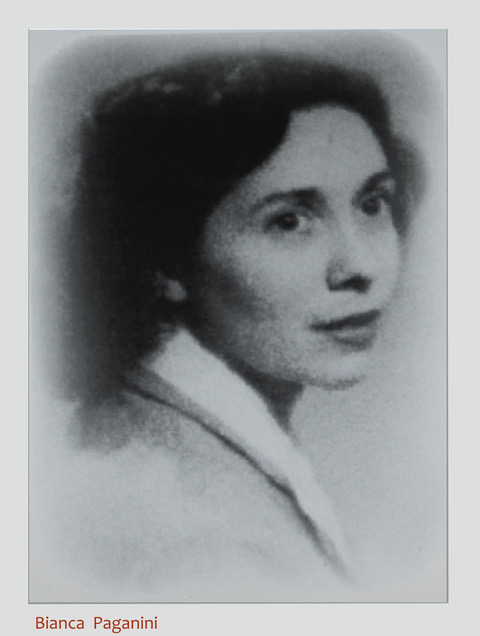Bianca Paganini-Mori
02.02.1922 - 05.05.2013, La Spezia
historian
Ravensbrück: October 12, 1944 ( together with mother Amelia and sister Bice) - after the death march liberated by American troops near Parchim on May 2, 1945

Bianca Paganini
Bianca Paganini was born on February 2, 1922 in La Spezia to a middle-class Catholic family. She graduated from a classical lyceum and then enrolled in the Faculty of Ancient Literature at the University of Genoa.
The deportation On the night of July 2-3, 1944, she was locked up in San Benedetto, where the family had been evacuated, along with her mother Amelia Giardini, her sister Bice, and her brother Alfredo for anti-fascist activities. Together with her brother Alfredo, she had participated in the partisan movement "Justice and Freedom". Together with the arrested family members, she was detained in the prison in "Villa Andreini" (number 420). Here she was until September 8th. Then she was taken to the Marassi prison and from there to the Bozen concentration camp via Milan on September 23. From here she was deported to Ravensbrück Concentration Camp (transport number 91, prisoner number 77399) in northern Germany on October 5, where she arrived on October 12, 1944 with her mother and sister.
Brother Alfredo was deported from the Marassi prison to the Flossenburg camp, where he died on December 6, 1944. At the end of 1944 the mother Amelia died in the Ravensbrück concentration camp.
Bianca and Sister Bice were sent to work in the Siemens Command, where she was until April 25, 1945 and was evacuated with the camp due to the approach of Soviet troops. After surviving the death march, Bianca and her sister were liberated by American troops in Parchim on May 2, 1945. They returned to La Spezia on September 13, 1945.
The return In Genoa Bianca finished her studies at the university, got a diploma in ancient literature and continued to teach.
Commitment Bianca maintained relations with her comrades who had also been deported and was one of the first to join the International Ravensbrück Committee. She left this in 2007 for health reasons. She was personally active to keep alive and pass on the memory of the deportation of Italian women to the Ravensbrück camp, in particular the historical memory of Ravensbrück.
In 1976 she was elected Vice President of the Committee of the National Representation in the ANED (Associazione nationale ex deportati die campi nazisti). In 1991 she was president of the ANED section for La Spezia. She was a member of the honorary committee of the national ANED. In 2003, she was called by the community of La Spezia as the "city elder" for her contribution to commemorate the deportation to the fascist extermination camps. On Remembrance Day 2011 she was awarded the Medal of Honor by the Presidium of the Council of Ministers, which is awarded to Italian citizens who were deported to fascist camps between 1943 and 1945. In 2012 she was awarded the honorary title "Knight of the Order for Services to the Republic of Italy" for the constant, extensive citizen engagement in preserving the memory of the persecution and deportation by the fascists and in preserving the values of freedom, justice, democracy especially in relation to awarded to the young generation.
Bianca left us on May 5th, 2013.
Her legacy is recorded in the following books: "The women of Ravensbrück" by Lidia Rolfi and Anna Maria Bruzzone, "From Liguria to the extermination camps" by Rosaria Fucile and Liana Millu, "I also chose the republic" by Anna Valle and Annalisa Coviello, and in the interviews in the Autovideo Museum of Resistance of the Province of Massa Carrara and La Spezia in Le Prade di Fosdinovo (MS) (www.museodellaresistenza.it) and in the digital archive of the memory of the future - project ISR La Spezia (www.vocidellamemoria.it )